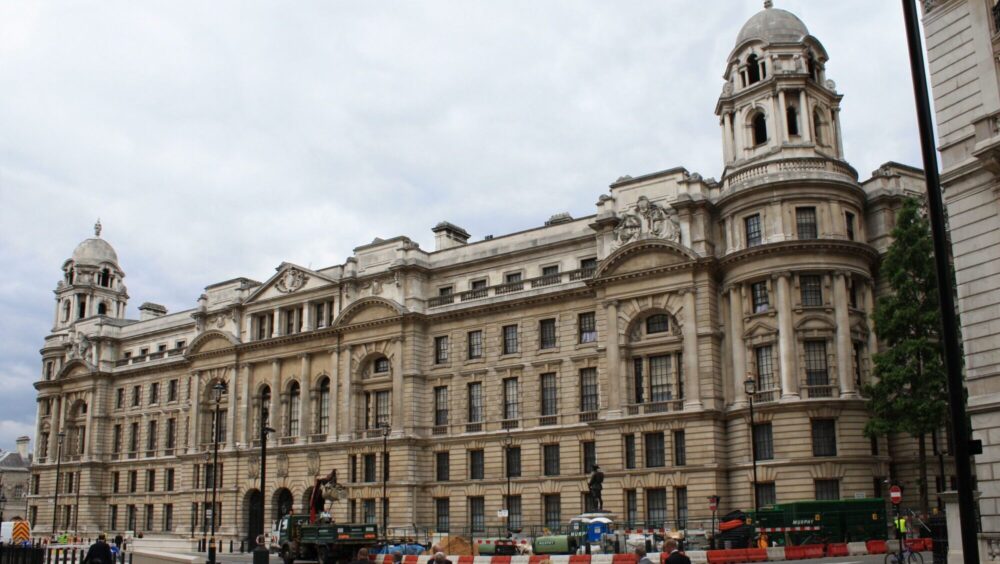
The Old War Office Building, Whitehall, London, UK
Robert Cutts, CC BY 2.0, via Wikimedia Commons
Senior civil servants—permanent state employees—advising Britain’s elected home secretary would widen the range of targets for counter-extremism policy, all while downplaying the proven, lethal challenge posed by Islamist groups. While institutions often fail to prevent actual violence, ‘the blob’—the nickname given to the current crop of woke, publicly funded yet largely anonymous policymakers—has been revealed as keen to redefine thoughts and words as dangerous.
Last week Home Secretary Yvette Cooper denied incorporating an extensive and now-public rogues’ gallery of types of wrong-think (and worse) into policy. Yet it was she who in August 2024 commissioned a “Rapid Analytical Sprint” approach to extremism, prompting her advisers to cook up a hit list of problematic ideas. Security minister Dan Jarvis also briefed Parliament that, while he didn’t know which Whitehall materials had been made public by the think-tank Policy Exchange, he would still distance them from current government policy.
Regardless of precisely which draft of the report was leaked to authors Andrew Gilligan and Dr Paul Stott, it is clear that Whitehall chiefs are seeking to centralise greater power for the authorities. Extremely Confused: The Government’s new counter-extremism review revealed shows how, in an Orwellian sleight-of-hand, civil servants recommended that Britain’s approach to extremism should turn away from “ideologies of concern” and turn instead to managing a wide range of troubling “behaviours.” The leaked report then goes on to give examples of such “behaviours” to clamp down on, by outlining the ideas it deems a problem.
The document came to light amid criticisms of institutional failure to control individuals already known to various agencies for harmful behaviour, most recently convicted Southport murderer Axel Rudakubana (largely ignored because he appeared to ‘lack a clear ideology’).
Instead of tackling the problem at hand, the expanded list includes “left-wing, anarchist and single issue (LASI) extremism,” “environmental extremism,” and Hindu and pro-Khalistan extremism. Away from formal politics, it cites several new ‘threats,’ including misogyny in parts of the online ‘manosphere,’ apolitical voyeurism regarding ‘gore and violence,’ and an interest in conspiracy theories, including UFO cover-ups.
Like Prime Minister Keir Starmer’s own recent statements and the European pattern of labelling populist dissent as ‘far right,’ even critics of two-tier policing (portrayed as a “right-wing extremist narrative”) are cited as the ‘type’ of person requiring state intervention. Unlike, say, those on the Pickup Artist/PUA scene, Britain’s Pakistani-heritage rape and torture gangs are not listed as misogynist, but to mention their “alleged” (sic) activities would form another strand of the “right-wing extremist narrative.”
Conversely, despite the overwhelming evidence that Islamists have dominated terrorist murders in Britain since 1999, a meagre 160 words are given over to exploring their place in the proposed new counter-extremism framework. Islamists warrant less coverage than 1990s eco-loons the Earth Liberation Front, last heard of in about 2014, after their final attacks on various inanimate structures, who the draft report grants their own case study.
The government has not (yet) formally incorporated this advice from a section of ‘the blob’ into law. But noises about reintroducing the non-crime hate incident into policing and making new laws on ‘harmful communication’ are not encouraging. Likewise, this proposed (further) conflation of thoughts and deeds would make the current counter-extremism policy endanger civil liberties further, even while killers continue to slip through its net.
